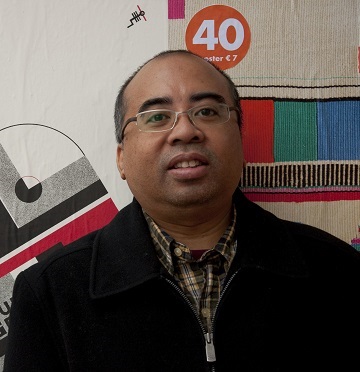Introducing New Staff 29
Selected Publications and Research Project

THUFAIL, Fadjar Ibnu
(Visiting professor, November 2013)
I am a researcher at the Research Center for Regional Studies of the Indonesian Institute of Sciences in Jakarta. I received my Ph.D. from the Department of Anthropology at the University of Wisconsin-Madison in 2007, where I wrote a dissertation titled Figures in the May 1998 Riots: Imagining the State in Post-New Order Indonesia. The dissertation examines how media, eyewitness, and investigative narratives of the May 1998 riots in Indonesia construct the figures of provokator (provocateur) and etnik Cina (ethnic Chinese). In my early work I have argued that the narratives of the riots represent not only the experience of the riots but also the imaginary realms people evoke when telling the stories of the event. My previous research on the riots received supports from MacArthur’s Global Security Fellowship, Social Science Research Council, and the Wenner-Gren Foundation for Anthropological Research. In addition, I received fellowships from Fulbright, Rockefeller Brothers, Scott-Kloeck Jenson, the University of Madison’s Center for Southeast Asian Studies Fellowship, and Presidential Fellowship of the University of Wisconsin.
After completing my Ph.D, I joined Max Planck Institute for Social Anthropology in Halle/Salle (Germany) from 2007 to 2010 as a research fellow. Then from 2010 to 2013 I became a member of Project Group on Cultural Property at the University of Goettingen. At Max Planck and Goettingen, I conducted research on the legal dimension of ethnic conflict and the politics of indigeneity.
My selected publications include “Ninjas in Narratives of Local and National Violence in Post-Soeharto Indonesia” in Beginning to Remember: The Past in the Indonesian Present, edited by Mary Zurbuchen (Seattle: University of Washington Press, 2005), “Riding the Postmodern Chaos: A Reflection on Academic Subjectivity in Indonesia,” in Diversifying and Decentring Southeast Asian Studies, edited by Goh Beng Lan (Singapore: ISEAS Press, 2011), The Social Life of Reconciliation: Religion and the Struggle for Social Justice In Post-New Order Indonesia (Max Planck Institute for Social Anthropology Working Paper Series, 2011), “When Peace Prevails on Kasih Hill: The Protestant Church and the Politics of Adat in Minahasa,” Asian Ethnicity 13: 4 (2012). In addition to the articles, I have published (with Martin Ramstedt) Kegalauan Identitas (Jakarta: Grasindo, 2011) and edited (also with Martin Ramstedt) a special issue of Asian Ethnicity, Vol. 13: 4 (2012).
I came to the ILCAA-TUFS by invitation from Dr. Koji Tsuda and Prof. Yuko Mio to contribute in the research project on Studies on ‘Chinese’ as Multiple Imaginations and Dynamic Realities’ . I will be working on a project titled “Figure of the Chinese in the Investigative Narrative of the May 1998 Riot in Indonesia,” focusing on the work of the Joint Fact Finding Team in investigating the May 1998 riots and in shaping and negotiating the material signification of the etnik Cina. The project is part of a book manuscript I am writing, tentatively titled The Impossible Moral State: Figures of the Chinese and Urban Riots in Indonesia. The manuscript addresses a question on why urban riots in Indonesia are often labelled “anti-Chinese violence.” I suggest that the discourse of anti-Chinese emerges to mask the talk about the state and its ambiguous politics of ethnicity and citizenship. I argue that the proponents of anti-Chinese discourse see how the figure of etnik Cina embodies a malignant and threatening state. At the same time the discourse of etnik Cina also unmasks an ambiguous state, always uncertain about its sovereignty and afraid of its citizen. These figurative ideas of the state highlight the desire to return to a moral state, called upon in the time of crisis to displace the maddening state.
Copyright © 2010 Research Institute for Languages and Cultures of Asia and Africa. All Rights Reserved.
